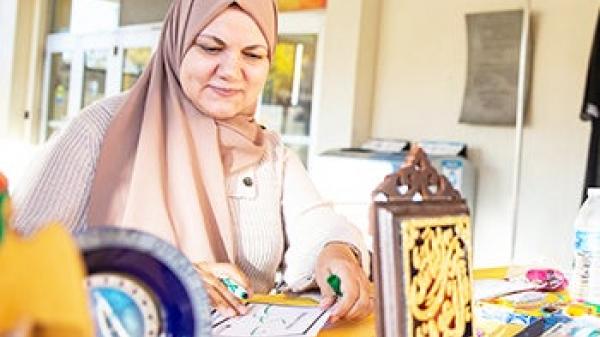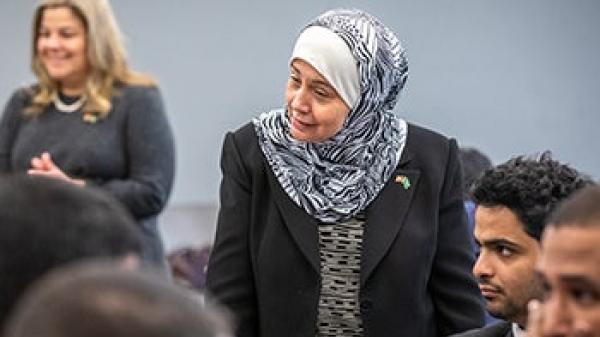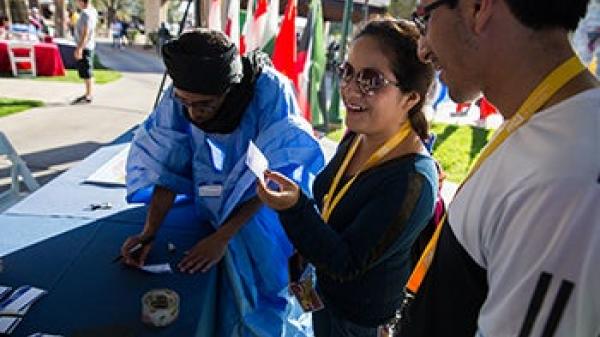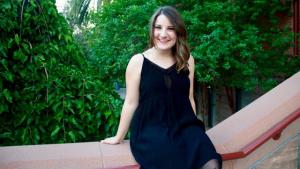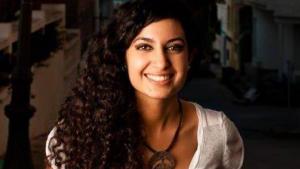Overview
The Arabic Program provides the necessary understanding of the culture of the Arab world which promotes peace, multiculturalism, diversity, and interfaith dialogue.
In Arabic language and culture courses you will study:
- Islamic Civilization and the significant contributions Arabic has made to the world.
- Arab-Islamic civilization at its peak during the middle ages when Europe experienced intellectual stagnation.
- The historical advancement of disciplines such as philosophy, astronomy, science, medicine, mathematics, literature and more that were first contributed to the world through Arabic.
- How Greek sciences were originally translated into Arabic, and then from Arabic into Latin.
- Islamic philosophy
- Arabic film and media
Knowledge of Arabic provides greater insight into the vast Arab World of 22 countries. In fact, many of our students use their Arabic studies in career fields such as:
- Domestic and International Business
- Diplomacy
- Education
- Journalism
- Translation
- International Consultations
- Government (UN, CIA, etc)
- Social Work
- Nursing
- Law
- Health Care and more.
Both the Arabic minor and the Arabic certificate provide critically needed educational and cultural knowledge of the Arab World and the Middle East that prepares students for life as employees and employers. Students majoring in liberal arts, social sciences, humanites, or any other discipline can gain an added advantage in today's job market with knowledge of Arabic languages and cultures.
Our students have paired their Arabic minor or certificate with a variety of other studies including:
- BA/Minor in Religious Studies: Islam in Global Context
- BA/Minor in History
- BA/Certificate in African and African American Studies
- BA/Certificates in Women and Gender Studies
- BA in English
- The Certificate in Islamic Studies
- The Certificate in Religion and Conflict
- BA/Minor Global Studies
- BA/Minor Political Science
- BIS Major and Concentration
Having a language and cultural background gives you a leg up in both professional and personal ventures. Employers appreciate the skills Arabic studies provide our students: cultural competency, critical thinking, new perspectives, and problem-solving skills.
If you are considering a minor or certificate in Arabic come meet one of our faculty or make an appointment with one of our advisors to find out how to get started in the Arabic Program!
Degrees
Arabic Studies (Minor)
Social media and nightly news are filled with events touching on the Middle East and Islamic nations. But how many people understand the deep issues at hand? You can. With a minor in Arabic studies, you'll have a cross-cultural understanding of Islamic civilization which will provide opportunities in the global workforce.
Arabic Studies (Certificate)
Earning a certificate in Arabic, the language of more than 22 countries, shows a commitment to understanding the cultures of a region with global impact. By learning about Arabic language, literature and culture, you'll be developing knowledge that is in demand in today's job market while broadening your perspective on global issues.
BA International Letters and Cultures (Arabic Studies)
Through approximately 420 million speakers around the world, Arabic is rooted in influential and emerging economies, ancient history and modern politics. When you know this strategic language, you will also have the cultural intelligence and competency that gives you a competitive edge and a pathway into a number of fields.
Outreach Programs
Arabic Language and Culture Club Members engage in the Arabic language and culture by interacting in different local environments that allow members to use the language. We offer current event discussions, homework help and tutoring, special events, and community services. No fluency in Arabic is required!
Saudi Students Club (SSC) is considered the second home for Saudi students in the USA. It represents the history, culture, and traditions of Saudi Arabia to both American and international students at ASU. It also participates effectively in many international and national activities that are held at ASU.
The MENA Students Union is a team of student volunteers that advise and assists the International Students and Scholars Center (ISSC) at Arizona State University (ASU) in regards to MENA students' cultures, academic success, and professional development initiatives. The club is open to all ASU students to participate.
The SILC Attaches Club is a club that brings all languages and cultures from SILC together. People are able to learn about different cultures in a fun way when studying a language. Understanding different cultures are such an important attribute to have, and it is one you can obtain through SILC Attaches. This club creates community events and outreach projects and plans fun get-togethers.
Arabic Film and Poetry Series: This event consists of 4 viewings each semester-- 2 modern Arabic films, and 2 Poetry performances per semester. The purpose of this event series is to promote the Arabic culture and celebrate the diversity of students.
Lecture Series: it's a collection of knowledgeable guest lecturers discussing topics surrounding Arabic and Islamic issues, concerns, and cultures.
Council for Arabic and Islamic Studies (CAIS) was established at Arizona State University to acknowledge the significant contributions of Arabic Studies and Islamic civilization and cultures to the world at large both historically and in the modern age. The Council’s research and teaching programs seek to promote multiculturalism, diversity, inter-faith dialogue, cross-cultural understanding, and the expansion of human civilization and cultures through Arabic as well as other Middle-Eastern languages including Persian and Turkish. The Council seeks to develop constructive academic and cultural interaction and partnerships between ASU and similar groups in the Arab and Muslim worlds.
The ability to speak another language opens up more opportunities for scholarships and fellowships. Take a look at our SILC scholarships. ASU also offers an extensive database for you to search through and find the right ones to apply for.
Here is a list of a few scholarships specific for language:
People
Faculty
Alumni Stories
Name Brieanna Griffin
Graduation year May 2016
Major(s) Anthropology and Global Studies
Minor Arabic Studies
Certificates Islamic Studies and TESOL
What is your current job?
I’m currently a Boren Scholar studying Swahili and living in Arusha, Tanzania. The Boren scholarship/fellowship provides American university students with the opportunity to study a less commonly taught/known foreign language outside of Europe, Australia and New Zealand.
How does language and culture help you succeed in your job or career?
My previous study of Arabic at Arizona State University well-prepared me to not only apply and receive the Boren scholarship but also to live in Tanzania now. When you learn a language, you learn so much about yourself and your own culture. Language largely shapes our worldview and my study of Arabic has helped shape my worldview for the better as I now understand that we must learn about other cultures and languages in order to be active global citizens. I would not be where I am today without my diligent and continued study of languages and cultures which has given me the skills necessary to live in and learn in cultures and societies very different than my own.
Did you study abroad? If so, can you explain your experiences?
Yes, I did have the opportunity to study abroad twice while I was an undergraduate at ASU and now I am fortunately studying abroad for the third time. The first time I studied abroad I went to Meknes, Morocco (summer 2014) where I studied Advanced Arabic and Islamic Society and Politics for 10 weeks. I also taught English there at a local NGO that provided free English classes to students who otherwise could not afford English classes. The following summer, I had the opportunity to travel to Zanzibar, Tanzania with an NGO called America’s Unofficial Ambassadors (AUA). My time in Zanzibar was largely made possible by the Friends of the Center grant from the Center for the Study of Religion and Conflict and by Barrett, the Honors College. My experiences living abroad outside of the Western context have helped me to grow as an individual and realize my potential as a learner. My time in Morocco and Zanzibar ultimately made me the ideal candidate for the Boren scholarship which I am currently studying in Tanzania with now.
How did the language program at SILC prepare you for your future?
The Arabic language program at SILC gave me the necessary tools to navigate the fast-changing and increasingly interconnected world we live in today. I wish everyone was required to learn a language and acquire fluency in the United States. We would be a much better country and stronger nation if this were the case.
What was your favorite thing about learning a language?
I love when I begin thinking in a language and stop translating everything I say from English to that language. This is happening with my Swahili now and it is very rewarding!
I also love that knowing many languages allows one to get to know people you may otherwise not be able to. The world is a big place and knowing another language(s) opens many doors (as cliche as that sounds)!
Name Lena Arkawi
Graduation year May 2009
Major Interdisciplinary Studies with concentrations in business and communications; Honors Diploma; Arabic Certificate
What’s your current job?
I just completed a 6 month contract at the United Nations, working on the first-ever, World Humanitarian Summit, which took place in Istanbul, Turkey. Now, I am going back to school to pursue my Master in Global Advocacy at George Washington University.
How do language and culture help you succeed in your career?
Since graduating in 2009 from Arizona State University, I have lived in the Middle East, living in Qatar, the United Arab Emirates and Turkey, as well as traveling to different countries in the Arab World. Having knowledge in Arabic and the Middle East culture helped me tremendously in gaining professional contacts and making new friends; it also provided me with an opportunity to work in a career as a public relations expert in the Middle East region. I often worked with Arabic-speaking media professionals, as well as developed and executed PR strategies that targeted Arabic-speaking audiences.
Did you study abroad? If so, can you speak about your experience?
I studied abroad in China, South Africa and Qatar. Studying abroad was the best experience I had in college. Studying in another country helps you grow, learn and explore different cultures, religions and languages, which expand your world view.
How did ASU and the language program at SILC prepare you for your future?
SILC’s Arabic language program prepared me for my time in the Middle East. The Arabic language courses strengthened my ability and confidence to communicate in Arabic. I am fortunate to have gone through the program, as those years I spent learning the language and culture provided me many opportunities to meet new people and secure jobs while I was living in Qatar and the United Arab Emirates.
What was your favorite thing about learning a language?
My favorite thing about learning a new language is that it opens the door to speak with more people who speak that language.
For me, my favorite thing about learning Arabic was that it strengthened my bond with my grandparents who still live in Syria. Since I am not able to see them often, my only means of connecting with them is by phone. Before the SILC program, I could only tell my grandmother a handful of sentences in Arabic (and she does not speak a word of English, besides “Hi, and I love you”). So after the SILC program my relationship to both my grandmothers became stronger because I was finally able to communicate in Arabic. Since then, I’ve called them more often and was able to learn about their life stories. Before the Syrian Revolution in 2011 and since graduating from college, I was able to visit my grandmothers 4 times. Thanks to my studies, I was able to spend my time with them and understand them in ways I never fully was able to when I was younger.
Name Amirah Ismail
Graduation year 2009
Majors Global Studies and Justice Studies
Minors/Certificates Arabic Studies and Islamic Studies
What's your current job?
I'm a Foreign Service Officer at the U.S. Department of State, currently working at the U.S. Embassy in Algeria.
How do language and culture help you succeed in your career?
Being a successful diplomat requires excellent language skills and substantive knowledge of international cultures. By speaking to people abroad in their own language, I can really connect with them, learn, and show that I respect their culture. And in this way, as an American and a diplomat, I can build new bridges.
Did you study abroad?
If so, can you speak about your experience? While at ASU, I was fortunate to take part in two study abroad opportunities: a summer program in Regensburg, Germany focused on German language and culture; and a semester abroad program at the American University in Cairo where I took courses in Arabic language, literature, sociology, and Islamic studies. Both programs were fantastic! I really enjoyed being immersed in local cultures and participating in a wide range of extracurricular activities. My time in Cairo was extremely valuable, as it led to a fascinating internship the following year at a well-known NGO founded by one of the region's leading democracy and human rights activists. My studies there also laid the foundation for the honors thesis I defended at the Barrett Honors College and prepared me well for the start of my career with the U.S. Department of State.
How did ASU and the language program at SILC prepare you for your future?
I had a wonderful experience at ASU learning from talented professors and fellow students and participating in student clubs. In particular, I am truly grateful to have had SILC's Dr. Souad Ali as my professor, thesis director, and mentor. I learned a lot from her courses, and from the guidance, she provided as I prepared my honors thesis. Her support and recommendations also helped me prepare a competitive application for the Charles B. Rangel International Affairs Graduate Fellowship, an award I won just one month before graduating from ASU. As a Rangel Fellow, I leveraged my ASU experience, obtained an M.A. in Middle Eastern Studies from George Washington University, and began working in the Bureau of Near Eastern Affairs at the U.S. Department of State.
What was your favorite thing about learning a language?
My favorite thing about learning languages is going beyond the textbook, beyond the classroom. Watching movies and TV, listening to music, reading the news, talking to locals, exploring a new street or city--this is really how you expand your vocabulary and immerse yourself in a culture. At ASU, I spent time engaged in these activities through the Arab Student Association and during my time abroad at the American University in Cairo.

